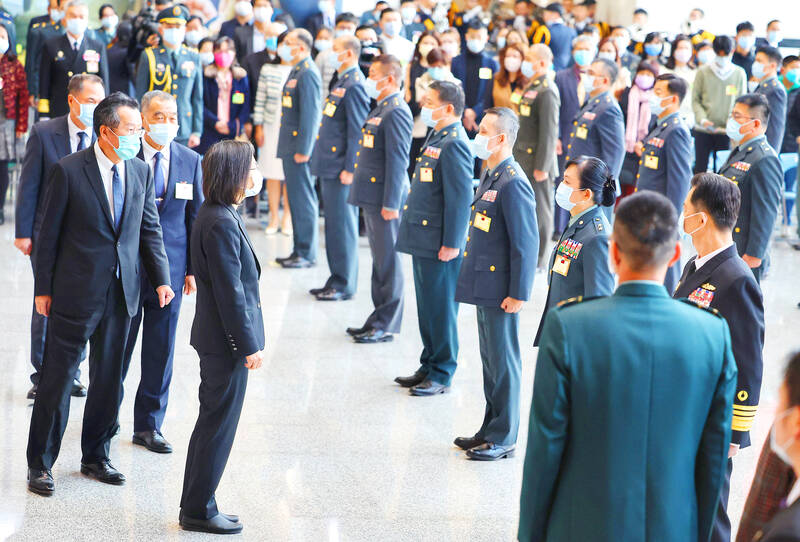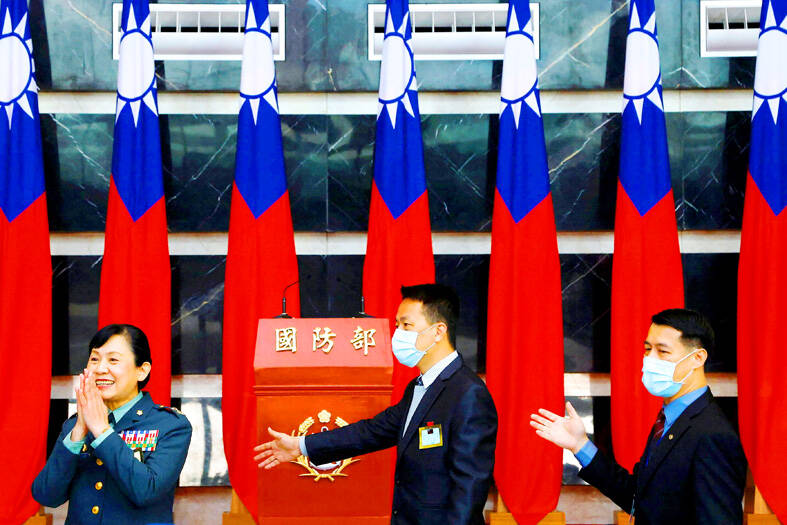President Tsai Ing-wen (蔡英文) is expected to announce a plan to bolster national defense at a news conference this afternoon, following a meeting with national security officials in the morning, the Presidential Office said yesterday.
This would be Tsai’s first news conference in two years.
She is widely expected to announce whether the mandatory conscription period is to be extended to one year from four months.

Photo: CNA
Tsai is to preside over a meeting of national security officials starting at 10am to discuss adjustments to bolster national defense, Presidential Office spokesman Chang Tun-han (張惇涵) said.
At noon, Tsai is scheduled to meet with Democratic Progressive Party legislators at the Taipei Guest House to discuss the new national defense plan, Chang said.
The president is then to present the plan to the public at 3:30pm and take questions from reporters, he added.

Photo: Ann Wang, Reuters
The plan and its supporting measures were drafted by the National Security Council and the Ministry of National Defense following a comprehensive two-year review of the national defense system, Chang said.
“In addition to announcing the new national defense plan to the public, we hope that political parties, civic groups, defense experts and others can engage in positive discussions over relevant issues, as we believe our common goal is to make the plan better,” he said.
Another national security meeting would soon be held to address challenges brought by international political and economic changes, Chang said, adding that Executive Yuan agencies would propose plans.
Separately yesterday, Tsai called on Taiwanese to unite to boost the nation’s security.
She made the call at a ceremony at the Ministry of National Defense headquarters to promote 28 senior military officers, including Taiwan’s first female two-star general.
Tsai thanked the officers for their tireless efforts and urged them not to become complacent, as there are many challenges facing the country.
“As we become better prepared, the chances that the aggressor might attack us diminish,” she said. “Taiwan will become stronger and safer if its people become more united.”
Eight officers were promoted to the rank of two-star general, namely lieutenant general and admiral, and 20 were promoted to the rank of one-star general, namely major general and vice admiral.
One of the newly promoted two-star generals is Chen Yu-lin (陳育琳), director of the Army Command Headquarters’ Political Warfare Department, who was promoted from major general to lieutenant general on Oct. 1.
Chen is the first woman to attain the rank of lieutenant general and the first female to lead a political warfare department in a Republic of China military command headquarters in the nation’s history.
Chen has set a number of firsts in Taiwan’s armed forces during her career. She became the first woman to be responsible for political warfare affairs at a defense command on an outlying island when she served in the Matsu Defense Command, and the first to head an army corps political warfare division with the Sixth Army Corps.
She was also the first female director at the defense ministry’s Political Warfare Cadres Academy and the first female deputy director of the ministry’s Political Warfare Bureau.
There are three other female major generals in Taiwan’s armed forces.

The combined effect of the monsoon, the outer rim of Typhoon Fengshen and a low-pressure system is expected to bring significant rainfall this week to various parts of the nation, the Central Weather Administration (CWA) said. The heaviest rain is expected to occur today and tomorrow, with torrential rain expected in Keelung’s north coast, Yilan and the mountainous regions of Taipei and New Taipei City, the CWA said. Rivers could rise rapidly, and residents should stay away from riverbanks and avoid going to the mountains or engaging in water activities, it said. Scattered showers are expected today in central and

COOPERATION: Taiwan is aligning closely with US strategic objectives on various matters, including China’s rare earths restrictions, the Ministry of Foreign Affairs said Taiwan could deal with China’s tightened export controls on rare earth metals by turning to “urban mining,” a researcher said yesterday. Rare earth metals, which are used in semiconductors and other electronic components, could be recovered from industrial or electronic waste to reduce reliance on imports, National Cheng Kung University Department of Resources Engineering professor Lee Cheng-han (李政翰) said. Despite their name, rare earth elements are not actually rare — their abundance in the Earth’s crust is relatively high, but they are dispersed, making extraction and refining energy-intensive and environmentally damaging, he said, adding that many countries have opted to

FORCED LABOR: A US court listed three Taiwanese and nine firms based in Taiwan in its indictment, with eight of the companies registered at the same address Nine companies registered in Taiwan, as well as three Taiwanese, on Tuesday were named by the US Department of the Treasury’s Office of Foreign Assets Control (OFAC) as Specially Designated Nationals (SDNs) as a result of a US federal court indictment. The indictment unsealed at the federal court in Brooklyn, New York, said that Chen Zhi (陳志), a dual Cambodian-British national, is being indicted for fraud conspiracy, money laundering and overseeing Prince Holding Group’s forced-labor scam camps in Cambodia. At its peak, the company allegedly made US$30 million per day, court documents showed. The US government has seized Chen’s noncustodial wallet, which contains

SUPPLY CHAIN: Taiwan’s advantages in the drone industry include rapid production capacity that is independent of Chinese-made parts, the economic ministry said The Executive Yuan yesterday approved plans to invest NT$44.2 billion (US$1.44 billion) into domestic production of uncrewed aerial vehicles over the next six years, bringing Taiwan’s output value to more than NT$40 billion by 2030 and making the nation Asia’s democratic hub for the drone supply chain. The proposed budget has NT$33.8 billion in new allocations and NT$10.43 billion in existing funds, the Ministry of Economic Affairs said. Under the new development program, the public sector would purchase nearly 100,000 drones, of which 50,898 would be for civil and government use, while 48,750 would be for national defense, it said. The Ministry of